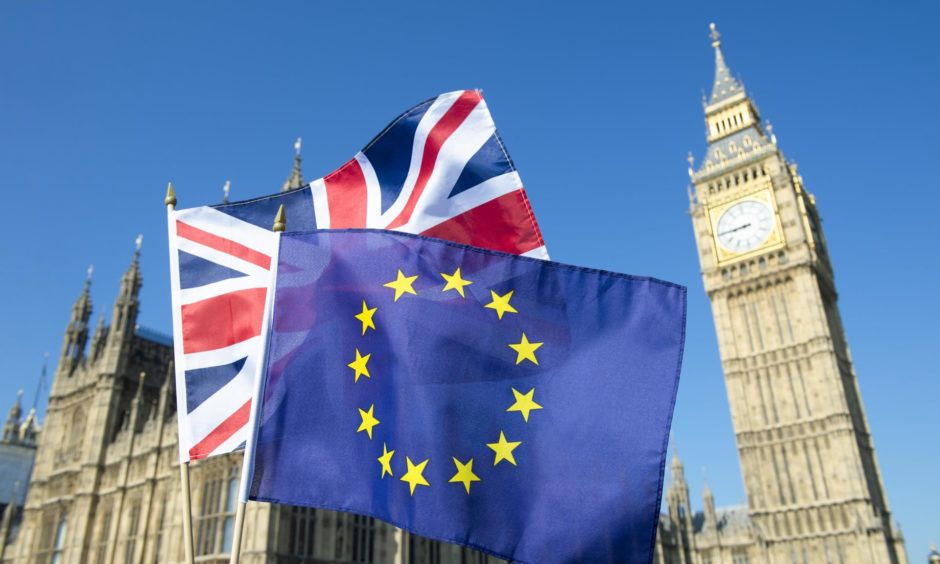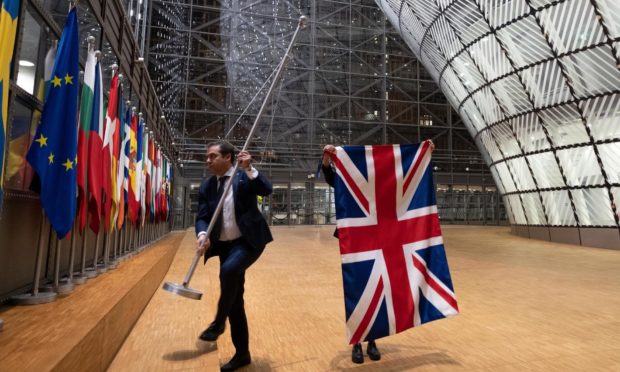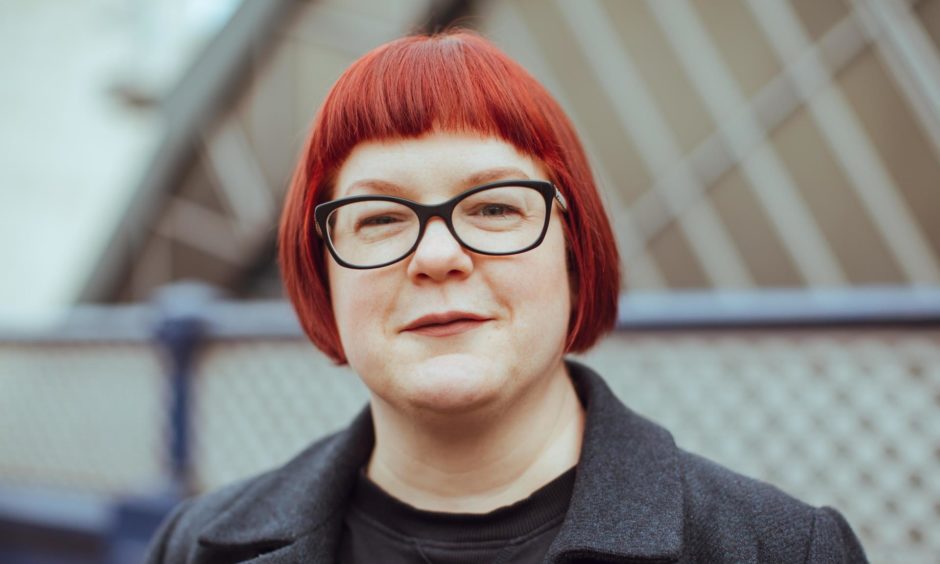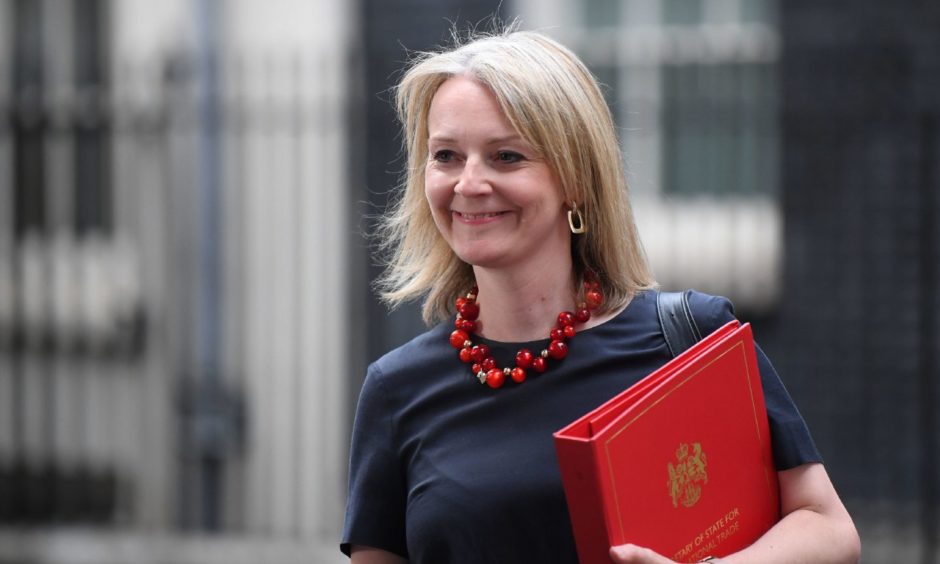“Brexit is just going to add to this perfect storm for women that’s raging at the moment”, according to Engender director Emma Ritch.
Those working in women’s equality claim their voices have been “absent” from the Brexit conversation which has so often focused on areas including trade, fisheries and the economic impact of leaving the EU.
However, there are significant concerns among leading legal experts in human rights that the loss of minimum standards guaranteed by EU law will make current rights available to women “vulnerable to change in the future”.
Ms Ritch, who heads up Engender, a feminist policy and advocacy organisation, says now the European underpinning to anti-discrimination law is gone, she expects to see an “increasing threat” to women’s equality.
Many EU laws have been brought into UK law so it is not the case these laws will disappear as a result of Brexit, but they will no longer have the European protection they once did.
“The equality law that the UK has is underpinned by is European law and so we no longer have that safety net so things like equal pay law, sex discrimination law, all of that, is based in European law which now no longer applies to us,” Ms Ritch says.
“And so do a lot of the very specific protections that women use including maternity leave, the right to time for antenatal appointments, protection for breastfeeding mothers, protections for part-time workers so there are a whole raft of things that have come to Scotland because of Europe.
“There’s also some international co-operation mechanisms that women particularly depend on so things like European protection orders mean that if women are protected in one member state from perpetrators of domestic abuse or stalking or harassment then those are recognised right across the EU, which is a system we will no longer be able to be a part of.
“Some of our criminal law, like those on human trafficking, are also underpinned by European law as well, which provides more protection by women than those that previously existed.”
Along with the increased pressures women face as a result of the Covid-19 pandemic, “Brexit is just going to add to this perfect storm for women that’s raging at the moment,” Ms Ritch claims.
Recent remarks by Women and Equalities Minister Liz Truss have done nothing to allay the concerns of those looking ahead to the future of women’s rights post-Brexit.
In a speech she delivered last month for the right-leaning Centre for Policy Studies think tank, Ms Truss said the government has focused too much on race, gender and sexuality issues at the expense of geographic inequality and class.
Asked about Ms Truss’s reported comments on focusing on class over race and sex, the Prime Minister’s official spokesman said last month he did not believe there was any suggestion that they would stop focusing on those issues.
But Ms Ritch says the speech “seemed quite at odds with the equality act” and “drove home the fact that there’s now no longer European protections for the Equality Act and it would be possible for the UK Government to change that or to get rid of it completely”.
She adds that women’s equality and rights have been “absent from the Brexit conversation” despite repeated calls from women’s organisations across the UK for experts in this area to be part of the negotiating team that went to Brussels.
I think what we are actually hearing from UK Government is a regression of commitment to human rights and a regression to commitment to equalities so we’re very concerned.”
Emma Ritch, Engender
She says: “We got fobbed off, I would say, and we didn’t ever get a sense that this was a priority for UK Government and it certainly hasn’t been part of the public conversation despite the fact these are bread and butter issues for women: maternity leave for women, maternity pay, part-time working.
“I think we ought to see really strong commitment from UK Government to existing anti-discrimination law and protections for workers and for citizens and commitment to human rights but I think what we are actually hearing from UK Government is a regression of commitment to human rights and a regression to commitment to equalities so we’re very concerned.”
‘We lose any future changes to EU law’
Professor Nicole Busby at Glasgow University says women’s employment rights will be “quite seriously threatened by Brexit”.
The moment Britain left the EU these became “vulnerable” and there remains “no guarantee” that the UK will keep pace with EU law, the human rights professor argues.
She says: “They (UK Government) could have made that guarantee but they didn’t so that means anything now that happens with EU law will not necessarily be reflected in our legislation.
“For example, there’s a work-life balance directive which is working its way through the EU legislative machinery and that will give rights to carers for paid leave so we won’t get that unless the Westminster government decides to do something itself on that, which is probably quite unlikely.
“We lose any future changes to EU law. We’ve lost jurisdiction of the European Court of Justice and that has been really pivotal in protecting women’s rights around things like equal pay and discrimination rights.”
Prof Busby, who lectures in human rights, equality and justice, says that “as well as not keeping pace with future change, we could now regress so we could go backwards”.
She adds: “The rights were only retained or protected up until the moment of departure.
“We didn’t agree to retain, for example, the EU Charter of Fundamental Rights, as part of UK law, that provides a statutory backstop.
“There’s a loss of minimum standards which are guaranteed by EU law and that makes our current provision vulnerable to change in the future.
“We could see some of those rights, or some of the minimum guarantees, reduced now that we are no longer part of the EU.”

The human rights professor agrees that women’s voices have not been heard in the debate and she believes there has been no focus on women’s rights or on broader workers’ rights.
She believes the real threat will come when the UK wants to make trade deals with those countries not inside the EU, as those countries will be able to trade freely with others that do not have “these relatively expensive, and might be seen as non-competitive, provisions”.
Prof Busby adds: “If we kept those protections then they could make trading with the UK more expensive, you could argue, so for that reason there might be a real incentive to strip back some of those rights.
“I think there’s a real threat that’s what could happen in the future.
“In many ways, you could say, well, maybe Covid-19 has squeezed out Brexit from a lot of the media reporting and I think that’s been true over the last year.
“But even before that those of us working in this area since the Brexit referendum have been surprised at the lack of attention in media and in public debate to women’s rights.”
Women ‘fleeing abuse’
Kirsty Thomson is legal director at Scottish Women’s Rights Centre, an organisation providing free legal information, advice and representation to women affected by violence and abuse.
She says a key change in the level of support some EU women and non-EU women can access post-Brexit will result in a “far larger” number of women fleeing abuse being left with no access to public funds.
This could potentially push some women who find themselves in this situation into rough sleeping or leave them vulnerable to other types of exploitation or abuse.
EU and non-EU women who applied to the UK’s Settlement Scheme will continue to have access to rights and support if they had their pre-settled or settled status approved.
However, women who are either European citizens, or family members of European citizens who moved to the UK after January 1 2021, will be subject to immigration control in the same way as non-EU nationals, which may mean having the ‘no recourse to public funds’ (NRPF) condition.
This condition limits the support migrants can access, meaning a woman subject to it would struggle to get temporary housing and would not be able to claim financial support such as child benefit or universal credit.
Ms Thomson says the issue is one of “human rights”, adding that the NRPF policy has previously been criticised at an international level by the UN’s Committee on the Elimination of Discrimination Against Women (CEDAW).
She adds: “Not only has nothing been done to change that policy but, because of Brexit, the number of women impacted by that policy has, all of a sudden, increased.
“Scottish ministers have written on several occasions last year, urging a change of policy in these areas, but had no response.
“The main barrier is immigration law and how it operates and that is devolved to the UK Government.
“You can’t make commitment to women’s rights on the one hand but yet have hostile immigration policies that actually throw up real barriers on the other.
“In terms of the Scottish position, we really need to find a way forward to ensure, whether it’s a change in legislation, whether it’s a change in how support is provided, that we can find a way to better protect women and clarify the route that women have in this situation.”
There is a six-month grace period for women who arrived in the UK before December 31 but have not yet applied for their settled or pre-settled status to do so.
The legal director says some women will not have applied because of “various hurdles” in the application process including difficulties in providing documentation or not knowing they have to apply in the first place.
You can’t make commitment to women’s rights on the one hand but yet have hostile immigration policies that actually throw up real barriers on the other.”
Kirsty Thomson, Scottish Women’s Rights Centre
However, the legal director fears there is a “perfect storm” awaiting women facing abuse, who do not have access to support.
She adds: “In terms of the pandemic, we know the impact of this on domestic abuse, the impact of an economic recession, this hostile immigration climate and this cutting off of public funds is an aspect of that and this key change is creating a perfect storm which undoubtedly is going to have an impact on women fleeing abuse.”
A Scottish Government spokesman described Brexit as “profoundly damaging for Scotland across a whole range of sectors, including on women’s rights and opportunities”.
He added: “We recognise the potential for adverse impacts on women’s rights, and are working to strengthen human rights safeguards in Scotland.
“The Scottish Government has consistently made clear that any regression in rights and protections following Brexit is unacceptable – we want to ensure we keep pace with the EU, not roll back.
“We also continue to urge the UK Government to change its policies on No Recourse to Public Funds and to lift restrictions for people at greatest risk from destitution, including families with children and women experiencing domestic abuse.
“Without access to safe accommodation and the means to support themselves, they may be at serious risk of exploitation and abuse.
“We are working with COSLA to finalise an anti-destitution strategy to improve support for people subject to NRPF as far as we can within devolved powers.”
‘We want equality for everyone’
A UK Government spokesman says the UK has a “proud history of pioneering women’s rights, and this won’t change now we have left the European Union”.
He adds: “We are looking at how the government can help to open up opportunities to everyone, no matter their sex, ethnicity or background. This is not a case of choosing one group over another. We want equality for everyone, everywhere.
“Anyone who has suffered domestic abuse will be treated as a victim first and foremost, regardless of their immigration status.
“This is why we have launched a £1.5million Support for Migrant Victims Scheme, alongside the Destitute Domestic Violence Concession and our work with charities to build an evidence base on how best to deliver tailored support for migrant victims.”




